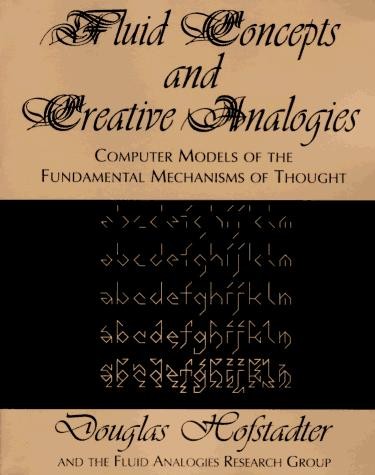Fluid concepts & creative analogies
computer models of the fundamental mechanisms of thought
By Douglas R. Hofstadter and Fluid Analogies Research Group

"Fluid concepts & creative analogies" is published by Basic Books in 1995 - New York, it has 518 pages and the language of the book is English.
“Fluid concepts & creative analogies” Metadata:
- Title: ➤ Fluid concepts & creative analogies
- Authors: Douglas R. HofstadterFluid Analogies Research Group
- Language: English
- Number of Pages: 518
- Publisher: Basic Books
- Publish Date: 1995
- Publish Location: New York
“Fluid concepts & creative analogies” Subjects and Themes:
- Subjects: ➤ Cognitive science - Analogy - Computer simulation - Artificial intelligence - Analogie (Philosophie) - Simulation par ordinateur - Computermodellen - Computersimulation - Sciences cognitives - Kognition - Denken - Waarneming - Künstliche Intelligenz - Kunstmatige intelligentie - Simulatiemodellen - Intelligence artificielle
Edition Specifications:
- Pagination: ix, 518 p. :
Edition Identifiers:
- The Open Library ID: OL1432732M - OL716837W
- Online Computer Library Center (OCLC) ID: 29429061
- Library of Congress Control Number (LCCN): 93044294
- ISBN-10: 0465051545
- All ISBNs: 0465051545
AI-generated Review of “Fluid concepts & creative analogies”:
"Fluid concepts & creative analogies" Description:
The Open Library:
Two ideas pervade the research. One is that the key question to answer is "What is a concept?" This means understanding how concepts overlap and trigger one another, how their fluid boundaries come about, how they give rise to generalizations and analogies, and so on. The second idea is that mental activity is fundamentally parallel, with many tiny agents independently carrying out small "subcognitive" acts and collectively building up coherent mental structures. Such agents lie far above the neural level, yet far below the conscious level; the hypothetical level of the brain at which they reside thus constitutes a largely uncharted substrate for thought. With these intuitions as guides, Hofstadter and the members of the Fluid Analogies Research Group have developed computer models that operate in small but extraordinarily challenging domains: playful anagram and number puzzles, analogy puzzles involving letter strings or tabletop objects, and fanciful alphabetic styles. These subtle ideas are spelled out with verve, charm, and clarity by Hofstadter and his co-workers in a series of chapters alternating with prefaces; the latter tie the projects together and give insight into their evolution. Readers of earlier works by Hofstadter will find this book a natural extension of his style and his ideas about creativity and analogy; in addition, psychologists, philosophers, and artificial-intelligence researchers will find in this elaborate web of ingenious ideas a deep and challenging new view of mind. Since 1977, Douglas R. Hofstadter and his graduate students at Indiana University and the University of Michigan have been developing computer models of discovery, creation, and analogical thought. What has emerged is a sophisticated and unorthodox vision of the mind in which perception, at an abstract level, is the key: perception of situations, of patterns, of patterns among patterns, even perception of one's perceptions. Fluid Concepts and Creative Analogies conveys this bold vision to a broad public as well as to cognitive scientists.
Read “Fluid concepts & creative analogies”:
Read “Fluid concepts & creative analogies” by choosing from the options below.
Search for “Fluid concepts & creative analogies” downloads:
Visit our Downloads Search page to see if downloads are available.
Borrow "Fluid concepts & creative analogies" Online:
Check on the availability of online borrowing. Please note that online borrowing has copyright-based limitations and that the quality of ebooks may vary.
- Is Online Borrowing Available: Yes
- Preview Status: full
- Check if available: The Open Library & The Internet Archive
Find “Fluid concepts & creative analogies” in Libraries Near You:
Read or borrow “Fluid concepts & creative analogies” from your local library.
- The WorldCat Libraries Catalog: Find a copy of “Fluid concepts & creative analogies” at a library near you.
Buy “Fluid concepts & creative analogies” online:
Shop for “Fluid concepts & creative analogies” on popular online marketplaces.